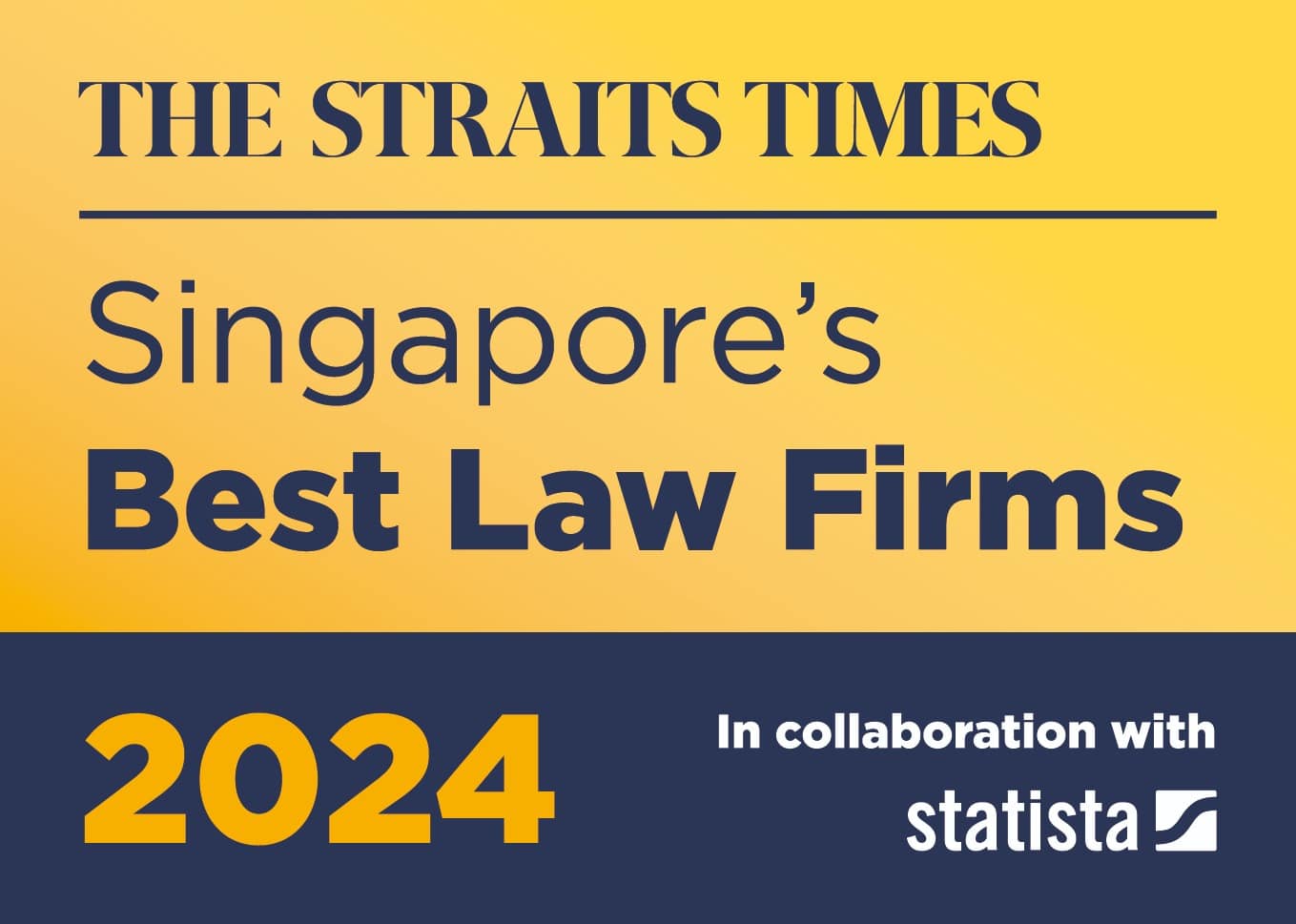Singapore's Most Trusted Divorce Lawyers
Experienced Divorce Lawyers in Singapore: Guiding You Through Trying Times
We pride ourselves on offering transparent and affordable fees for divorce, demonstrating our commitment to delivering high-quality service and the assurance of clear, straightforward costs. We understand that the financial uncertainties associated with divorce can add to the emotional stress of the situation. Hence, our goal is to provide comprehensive clarity, ensuring that you’re fully aware of the financial implications and can focus on navigating your personal journey.
When a marriage breaks down, dealing with divorce and separation can be profoundly distressing. Beyond the immediate emotional toll, there are critical legal considerations to manage. These include childcare arrangements, spousal support, and the division of complex assets such as property, CPF funds, and other joint investments. These multi-faceted challenges underline the necessity for experienced and competent legal professionals, capable of offering informed advice and empathetic support.
Singapore Divorce Law: A Comprehensive Look
Navigating Singapore’s divorce law requires a deep understanding of its provisions and complexities. By default, a married couple can only apply for divorce after being married for at least three years. However, there are exceptions to this rule in certain circumstances. For instance, in cases involving violence against a spouse, divorce may be granted even before the three-year period has elapsed. Alternatively, there could be grounds for the annulment of a marriage, such as in situations of wilful non-consummation.
Consider, for instance, the case of “Ms. A,” who approached us after enduring two years of an abusive marriage. Despite being married for less than the stipulated three years, we managed to successfully argue for an early divorce on her behalf based on the exceptional hardship she faced. Our team is well-equipped to identify such exceptional circumstances and present a compelling case in your favor.
Grounds for Divorce: Understanding the Criteria
The court typically grants a divorce due to an irretrievable breakdown of the marriage, usually resulting from unreasonable behavior by one party, or a separation period of three years with mutual consent or four years without. For instance, in the case of “Mr. B,” he sought our assistance after his wife had moved out of their shared residence and cut all contact for more than four years. Leveraging our understanding of Singapore’s divorce law, we helped Mr. B successfully file for divorce on grounds of long-term separation without consent.
Our experienced team is adept at handling these intricate legal nuances, advising you on the most suitable path forward given your unique circumstances.
The “No-Fault” Divorce Principle in Singapore Law
A cornerstone of Singapore’s divorce law is the “no-fault” principle. Generally, this means that the reasons leading to the breakdown of the marriage are not taken into account by the Court when determining the division of matrimonial assets or the assessment of maintenance. This forward-looking approach promotes resolution and agreement, minimizing conflict and facilitating a smoother process. It is another area where our seasoned divorce lawyers can provide valuable guidance, ensuring fair outcomes for our clients.
Our Dedicated Team: Your Ally at Every Step
Our team of experienced and competent divorce lawyers is committed to exploring all possible outcomes to efficiently resolve your situation. We approach each case with the intent to handle matters in a non-confrontational, constructive manner. This strategic approach fosters a supportive environment that not only reduces emotional strain but also encourages fruitful discussions.
For example, in the case of “Mrs. C,” we helped facilitate an amicable agreement regarding asset distribution and child custody with her estranged spouse. By promoting constructive dialogue, we were able to avoid court proceedings, thus sparing Mrs. C additional emotional and financial stress.
However, if court representation becomes necessary, our capable team will defend your rights and interests robustly. We have successfully represented numerous clients in court, such as “Mr. D,” where we secured a fair asset distribution ruling despite his high-conflict divorce.
Beyond Divorce: Comprehensive Family Law Services
Our expertise extends beyond divorce proceedings, encompassing all facets of family law, including child custody disputes, alimony, post-divorce estate planning, adoption matters, and more. We also provide legal assistance for related concerns like prenuptial and postnuptial agreements, deed of separation, and annulment proceedings. Our holistic approach ensures that you have the necessary resources to navigate the complexities of your situation.
For instance, “Ms. E” approached us with concerns about her post-divorce financial stability. Our team offered expert guidance, helping her draft a comprehensive post-divorce financial plan, ensuring her financial security and peace of mind.
Navigating Divorce Proceedings in Singapore with our experienced divorce lawyers: Key Legal Reforms and Their Implications in 2023 – https://www.mlaw.gov.sg/news/parliamentary-speeches/2023-05-08-2r-speech-family-justice-reform-bill-by-rahayu-mahzam/
The Singaporean legal landscape concerning divorce proceedings is evolving, thanks to several amendments and proposed reforms in the Family Justice Act and the Women’s Charter.
2023 – Understanding the Changes to the Family Justice Act and the Women’s Charter; Changes that our Divorce Lawyers understand
Two significant additions to the Family Justice Act are section 11C and section 46(ha) of the Women’s Charter. Section 11C enables the Family Justice Courts (FJC) to impose restrictions on cross-examination in prescribed situations. This addition seeks to protect victims of family violence from potential re-traumatization during direct cross-examination by alleged perpetrators, a challenging situation which could also impair the victim’s capacity to provide clear and cogent evidence. This provision empowers the court to limit the scope and duration of cross-examination, or even disallow direct cross-examination in cases involving family violence or an application to alter a protection order.
Meanwhile, section 46(ha) of the Women’s Charter allows the court to determine a child’s wishes through various modes, including interviews conducted by a judge. This enhancement aligns with the principle of prioritizing a child’s welfare in custody decisions and ensures that a child’s voice is heard more directly in proceedings that significantly impact their lives.
2023 – Simplifying Court Terminology and Streamlining Court Processes in Divorce Proceedings; Knowledge that is important for our Divorce Lawyers to share with you
The legal jargon in court proceedings often presents a barrier to public understanding. To address this, the family justice system is adopting simplified terms consistent with the amendments in civil court proceedings under the Courts (Civil and Criminal Justice) Reform Act 2021 and the Rules of Court 2021. For example, “Plaintiff” will now be referred to as “Applicant”, “Defendant” as “Respondent”, and “Writ for divorce” as “originating application for divorce”. These changes aim to enhance access to justice and make court processes more understandable for the public, particularly those unable to afford legal representation.
2023 – Expanding Mediation and Alternative Dispute Resolution; A role that our Divorce Lawyers will play for you
Singaporean courts have long recognized the value of mediation and Alternative Dispute Resolution (ADR) processes in resolving family conflicts. Amendments to the Family Justice Act will further clarify the court’s power to order parties or children to undergo mediation, counselling, or participate in family support programs. It also reinforces the court’s authority to appoint judicial officers or others, such as volunteer lawyers, to conduct these sessions. To ensure compliance, the court can make appropriate orders, such as staying proceedings until the orders are complied with.
2023 – Fair Payment of Judgment Sums; Solutions that our Divorce Lawyers will apply for you
The last significant reform adopts Section 43 of the State Courts Act, which allows the Family Court to order that a judgment sum be paid in a lump sum or by installments. The court can also suspend or stay a judgment if the debtor is unable to pay. This amendment is especially vital in family proceedings where additional litigation might strain relationships further and adversely impact children involved.
In conclusion, these proposed changes are significant steps towards a more progressive, compassionate, and efficient family justice system in Singapore. They serve as a testament to the ongoing efforts to enhance access to justice, protect families, and especially safeguard children involved in family proceedings. The effectiveness of these reforms will undoubtedly shape Singapore’s family justice landscape in the years to come.
Glossary of Legal Terms used in Divorce Proceedings
Adultery: A reason for divorce where one spouse has had sexual relations with another person outside the marriage.
Ancillary Matters: Issues relating to child custody, maintenance, and division of matrimonial assets that are usually determined after the interim judgment is given.
Annulment: The legal procedure that declares a marriage null and void, as though it never existed.
Child Custody: Refers to the legal arrangement between parents over a child.
Deed of Separation: A legally binding document that outlines the terms and conditions of a couple’s separation.
Desertion: A ground for divorce where one spouse has abandoned the other for a continuous period of at least 2 years without consent, justification, or intention of returning.
Divorce Application (Writ for Divorce): The legal document filed at the court by the party seeking a divorce.
Family Justice Courts (FJC): The court system in Singapore that deals with family law matters, including divorce.
Grounds for Divorce: The legally acceptable reasons for seeking a divorce. In Singapore, it must be shown that the marriage has irretrievably broken down.
Interim Judgment: The court’s initial decision to grant a divorce, pending resolution of ancillary matters.
Maintenance: The financial support given to a spouse or children either during marriage or after divorce.
Matrimonial Assets: Matrimonial assets include any asset acquired during the marriage by one or both parties. They also include any asset owned by one or both parties before the marriage, which has been used by the wife or the husband or both of them for their own benefit or for the welfare of their family.
Mediation: A dispute resolution process where a neutral third party (mediator) helps the divorcing parties to reach agreements on contested issues.
Personal Protection Order (PPO): A court order that protects a person from family violence.
Unreasonable Behaviour: Behaviour by one spouse that makes it intolerable for the other spouse to continue living with them.
Sole Custody: An arrangement where only one parent has the decision-making rights, responsibilities, and authority relating to the child.
Joint Custody: An arrangement where both parents share decision-making rights, responsibilities, and authority relating to the child.
Final Judgment: The final decision by the court that officially ends the marriage. This is granted three months after the interim judgment.
The Commitment of our Divorce Lawyers to you and to building trust during the Divorce Proceedings
We commit to guiding you at every stage, empowering you to make informed decisions about your future. Our dedicated team appreciates the sensitivity of divorce matters and handles each case with the utmost discretion and respect. With a team of experienced and competent divorce lawyers who are not only proficient in their field but also empathetic and understanding, we stand ready to support you during this difficult time. Trust in our commitment to securing the best possible outcome for your divorce proceedings.
The Straits Times, in collaboration with Statista, has recognized I.R.B Law as one of the leading family law firms in Singapore. This honor mirrors our unwavering commitment to legal excellence and our ability to deliver exceptional legal services tailored to our client’s unique needs.
Trust in our dedicated team’s ability to guide you through this complex process with competence, compassion, and respect. Our team’s dedication, coupled with our experience in dealing with diverse and complex cases, makes us your ideal ally in seeking a successful resolution to your legal process in Singapore.
Author: Mohamed Baiross/IRB LAW LLP

Frequently Asked Questions
How can I get a divorce in Singapore?
Am I eligible to seek a divorce?
In order to commence civil proceedings for divorce in Singapore, one of the parties filing for divorce is required to fulfil the requirements as follows (sections 93 and 94 of the Women’s Charter):
- Be domiciled in Singapore during the commencement of divorce proceedings (‘domicile’ means to treat Singapore as a permanent home) ;
- Residing in Singapore for a minimum of 3 years, before divorce proceedings is commenced; and
- Have been married for a minimum of 3 years, except where the party filing for divorce has suffered unbearable hardship or exceptionally cruel behaviour.
If you are at all unsure of your eligibility please get in touch for a free, no obligation discussion.
What are the legal requirements for divorce in Singapore?
What are the legal reasons for divorce in Singapore
It is compulsory for the party filing for divorce to prove that the marriage has irretrievably broken down due to one or more of the reasons. These are:
Adultery: The plaintiff (which is the applicant for the divorce) finds it intolerable to live with the defendant (the other party) due to them having committed adultery. Adequate evidence is required to prove the defendant’s act of adultery. The plaintiff may hire a private investigator to gather evidence. If the plaintiff could not provide adequate evidence, it is advisable for them to opt for another grounds for the divorce, unless the defendant is willing to confirm that they have committed adultery.
Unreasonable behaviour: The defendant has behaved in an unreasonable manner that the plaintiff finds it impossible to continue living with the defendant.
Desertion: The defendant deserted the plaintiff for a minimum of 2 years where the defendant shows no intention or sign of returning.
Separation: The parties have lived apart for at least 3 to 4 years and both parties have agreed to divorce.
What is the process of getting a divorce in Singapore?
In Singapore, divorce through civil proceedings involves 2 steps:
Step 1: Dissolution of Marriage
Step 2: Ancillary Matters (matters regarding custody of child, division of matrimonial properties and spousal maintenance)
At the end of the Step 1, if the court decides that the divorce is successful, the court will grant an Interim Judgment, which is an order to dissolve the marriage. The Interim Judgment is a temporary judgment and it is not a final judgment.
After the court has granted an interim judgment, the court will proceed to Step 2, which is to settle the ancillary matters.
Parties are required to wait for 3 months (from the date of Interim Judgment is granted) in order to apply for converting the Interim Judgment to become the Final Judgment.
What are the costs of getting a divorce in Singapore?
What is the emotional impact of divorce in Singapore?
How can I find a good divorce lawyer in Singapore?
Do you have any tips for going through a divorce in Singapore?
What resources are available for people going through a divorce in Singapore?
How long does the divorce process take?
If the divorce is uncontested, an interim judgment can be made in around 1 month. After this point there is a mandatory 3 month period before the judgment becomes final.
If your divorce is contested, it may take 12 months or more depending on the nature of the dispute.
Meet Some of Our Team
Mohamed Baiross
Founding Partner
Baiross is the managing partner of IRB Law LLP. He is an experienced lawyer with an excellent reputation across a broad selection of practice areas including divorce, insolvency, crime, probate, syariah, and civil litigation.
Kulvinder Kaur
Partner
Kulvinder’s practice focuses on civil and commercial litigation, and matrimonial affairs. She has successfully obtained sole custody and highly favorable access arrangements for her clients (both mothers and fathers).
Featured Divorce Content

Guide to Divorce in Singapore
isdiction and eligibility For the Singapore Courts to have jurisdiction to hear proceedings for divorce, either of the parties: Must…
26.04.2024

Marriage Annulment in Singapore: Complete Guide
You just got married and it isn’t working out - must you wait three years before ending it? No, you…
25.06.2025

Uncontested Simplified Divorce in Singapore
A divorce is never easy but can become even more complicated if it becomes a contested divorce proceeding. In many…
14.06.2022









